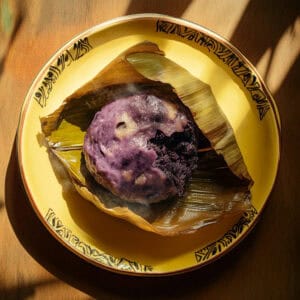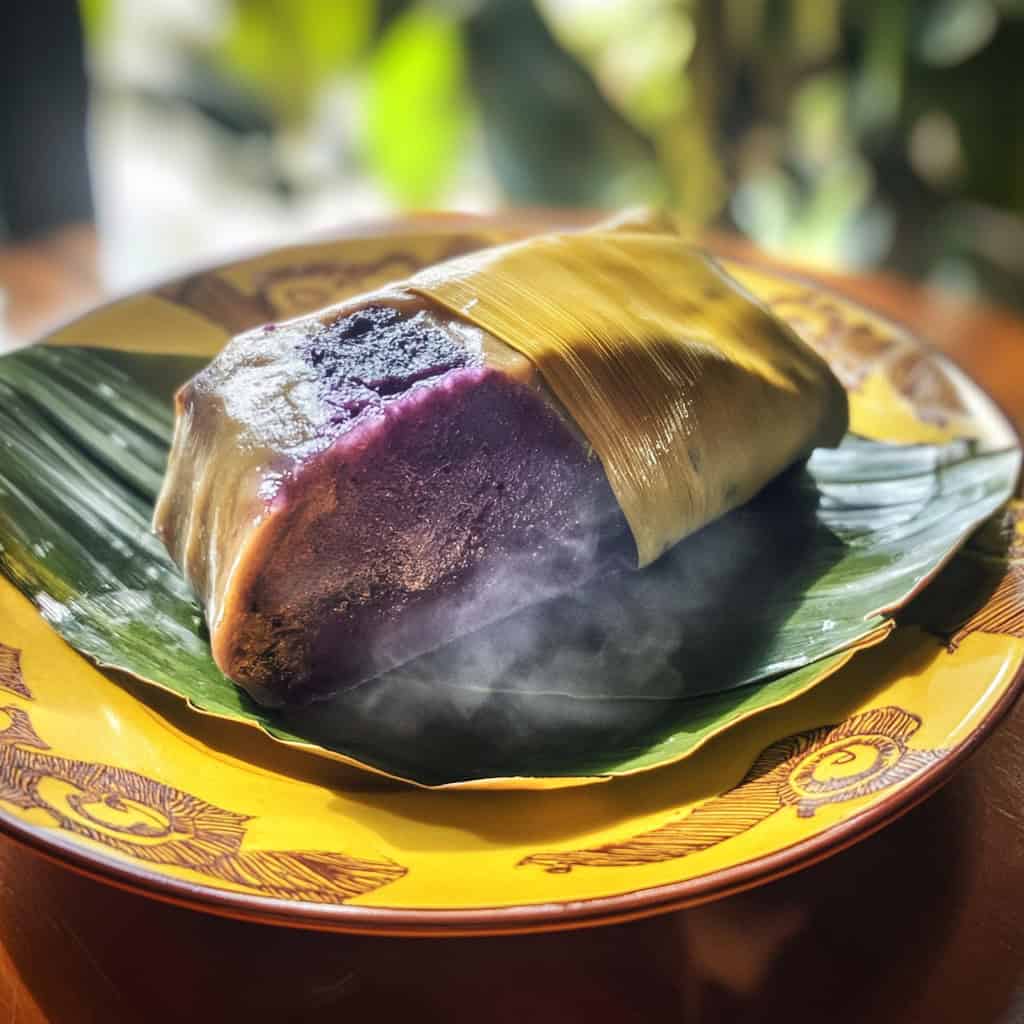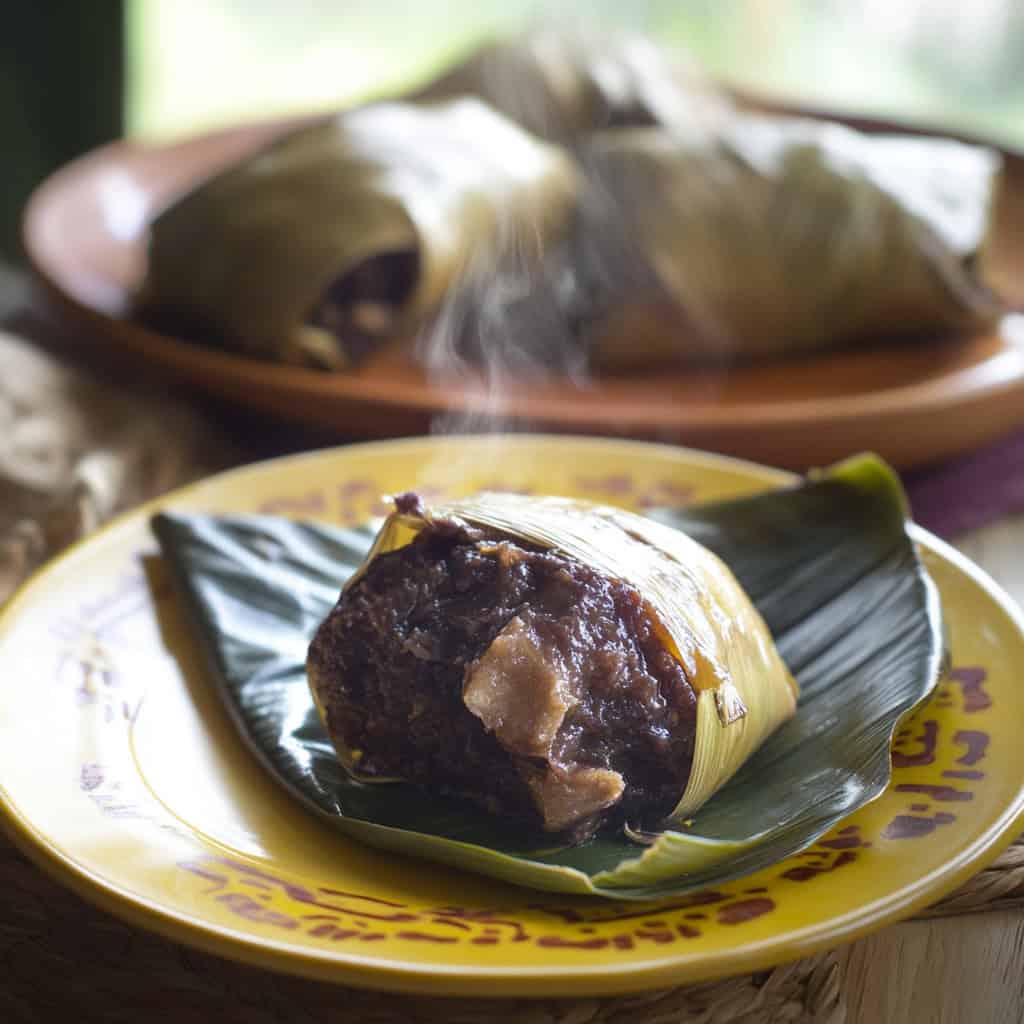
Authentic Binagol Recipe
A traditional Filipino taro and coconut dessert from Leyte, modernized with mini cake tins replacing coconut shells. This vegan Binagol maintains authentic flavors and textures through steamed taro root, coconut cream, and banana leaf wrapping, yielding a rich, pudding-like delicacy with a satisfying chew and subtle sweetness. A genuine taste of Philippine heritage adapted for today's kitchen.
Equipment
- Steamer Essential for cooking both the taro and the final binagol; a bamboo steamer works wonderfully but any steamer will do
- Food processor Creates the smooth, consistent texture needed for authentic binagol
- 4-inch Round Cake Tins (2 inches deep) Substitutes for traditional coconut shells
- Banana Leaves For lining and wrapping the binagol, providing authentic flavor and presentation
- Kitchen Towels Helpful for wrapping the steamer lid to prevent condensation dripping
- String or Kitchen Twine For securing the banana leaf wrapping
- Measuring cups and spoons For accurate ingredient measurements
- Knife and cutting board For peeling and cubing the taro
Ingredients
- 1 pound 450g taro root (gabi), peeled and cubed
- 1 can 13.5 oz/400ml coconut cream (not coconut milk)
- ½ cup 100g coconut sugar (or Philippine muscovado sugar)
- 2 tablespoons coconut oil for brushing banana leaves
- 8-10 banana leaves cut into rounds or squares (for lining and wrapping)
Instructions
- First, wear gloves to peel the taro root to prevent skin irritation, then cut it into 1-inch cubes (Balatan at hiwain ang gabi ng parisukat). Place the cubed taro in a steamer basket over boiling water (212°F/100°C). Steam for 20 minutes or until completely tender when pierced with a fork. Check water levels during steaming and add more hot water if needed (I-steam ang gabi sa loob ng 20 minuto o hanggang sa ito ay lumambot).
- Transfer the steamed taro to a food processor. Add the coconut cream and coconut sugar (Ihalo ang nilutong gabi, gata, at asukal sa food processor). Process until you achieve a smooth, thick consistency with no lumps. The mixture should be thick but pourable (I-blend hanggang maging malambot at walang butil-butil).
- Wash banana leaves thoroughly and pat dry. Cut into pieces that will fit your 4-inch cake tins with some overhang (Hugasan at patuyuin ang mga dahon ng saging. Gupitin ito ayon sa laki ng cake tin). Brush banana leaves with coconut oil and use them to line your cake tins, allowing the edges to hang over the sides (Pahiran ng langis ng niyog ang mga dahon ng saging at ilagay sa loob ng cake tin).
- Pour the binagol mixture into the lined cake tins, filling each about ¾ full (Ibuhos ang hinalong binagol sa cake tin na may dahon ng saging). Place another banana leaf on top of each filled tin and fold the overhanging leaves over to seal. Secure with kitchen twine or ribbon (Takpan ng isa pang dahon ng saging at talian ng mahigpit).
- Place the wrapped tins in a steamer over boiling water (212°F/100°C). Wrap the steamer lid with a kitchen towel to prevent condensation from dripping onto the binagol. Steam for 20 minutes at medium-high heat (I-steam ang binagol sa loob ng 20 minuto. Balutin ang takip ng steamer ng tuwalya para hindi tumulo ang tubig sa binagol).
- Remove from the steamer and allow to cool at room temperature for 2-3 hours. The binagol will appear slightly wet at first but will continue to set and firm up during this time (Palamigin sa temperatura ng kwarto sa loob ng 2-3 oras para tumigas nang maayos). Serve directly from the banana leaf wrapping using a spoon (Ihain na nakawrap pa rin sa dahon ng saging at kainin gamit ang kutsara).
Tips from Lola's Kitchen

- Taro Selection: Choose firm taro roots with minimal blemishes. When cut, fresh taro should be white with purple specks, not discolored.
- Banana Leaf Preparation: Quickly pass banana leaves over an open flame or hot stovetop to make them more pliable and release their aroma.
- Perfect Consistency: The ideal binagol should be slightly firm but still creamy when scooped with a spoon—similar to a thick pudding.
- Taro Handling: If your hands get itchy from handling raw taro, rub with vinegar to alleviate irritation.
- Natural Molds: If you happen to have coconut shells, use them for the most authentic presentation.
Traditional Serving Suggestions
- Serve binagol as a mid-afternoon merienda (snack) with hot tea or coffee
- Enjoy as a dessert after a traditional Filipino meal
- Serve small portions due to its rich, filling nature
- Present still wrapped in banana leaves for authentic presentation
- Traditionally eaten with wooden or coconut shell spoons for a complete cultural experience
Troubleshooting
- Binagol is too soft: It may need more steaming time or hasn't set long enough. Allow to cool completely.
- Mixture is lumpy: Ensure taro is fully cooked and properly processed until smooth.
- Banana leaves tearing: They may be too dry. Pass them briefly over heat to make them more pliable.
- Too sweet or not sweet enough: Adjust sugar to taste in your next batch. Traditional binagol from Leyte tends to be quite sweet.
Ingredient Alternatives
- No taro available? Purple sweet potato (ube) or regular sweet potato can substitute, though the flavor will be different
- No coconut cream? Combine thick coconut milk with coconut oil for a richer consistency
- No coconut sugar? Use dark brown sugar or regular muscovado sugar
- No banana leaves? Use parchment paper brushed with coconut oil (though you'll miss some of the traditional flavor)
Storage & Reheating
- Storage: Binagol will keep in the refrigerator for up to 5 days when wrapped tightly in plastic wrap or stored in an airtight container.
- Freezing: Can be frozen for up to 3 months. Wrap individual portions in plastic wrap, then aluminum foil.
- Reheating: To enjoy warm, steam for 5-10 minutes until heated through. Microwaving is not recommended as it can create an uneven texture.
- Room Temperature: For the best texture and flavor, allow refrigerated binagol to come to room temperature before serving.
Variations
Modern Binagol Pie
- Use the binagol mixture as pie filling in a prebaked graham cracker or nut crust
- Bake at 350°F (175°C) for 15-20 minutes until set
Chocolate Binagol
- Add 2 tablespoons of cocoa powder to the mixture for a chocolate-taro combination
Pandan Binagol
- Add 1 teaspoon of pandan extract to the mixture for a fragrant twist
Binagol Cups
- Serve in small cups topped with toasted coconut flakes for a modern presentation
Ube-Binagol Fusion
- Mix in 2 tablespoons of ube halaya or ube extract for a purple-hued variation
Frequently Asked Questions
Q: What does binagol taste like? A: Binagol has an earthy, nutty flavor from the taro, complemented by the rich creaminess of coconut and subtle caramel notes from the coconut sugar. Q: Is binagol vegan? A: Traditional binagol often contains condensed milk and egg yolks, but this version is completely vegan while maintaining authentic flavor. Q: Can I make binagol without banana leaves? A: Yes, though banana leaves add a distinct aroma and flavor. Parchment paper can substitute but won't provide the same traditional flavor notes. Q: How do I know when my binagol is done cooking? A: After steaming for 20 minutes, the binagol may still appear slightly wet but will set further as it cools. Q: Why is my taro itchy to handle? A: Raw taro contains calcium oxalate crystals that can cause skin irritation. Wear gloves when handling, and cooking neutralizes this effect. Q: How is binagol different from nilupak? A: While both are mashed root vegetables with coconut, binagol is specifically taro with coconut cream and sugar, steamed in containers, while nilupak can be made with various root vegetables and is typically served fresh. Q: What makes binagol special among Filipino desserts? A: Its unique preparation method, distinctive texture, and regional significance as a pasalubong from Leyte make it stand out among Filipino kakanin.
Nutrition
Calories: 235kcalCarbohydrates: 24gProtein: 2gFat: 16gSaturated Fat: 14gPolyunsaturated Fat: 0.1gMonounsaturated Fat: 0.3gSodium: 15mgPotassium: 440mgFiber: 3gSugar: 12gCalcium: 25mgIron: 2mg
Tried this recipe?Let us know how it was!